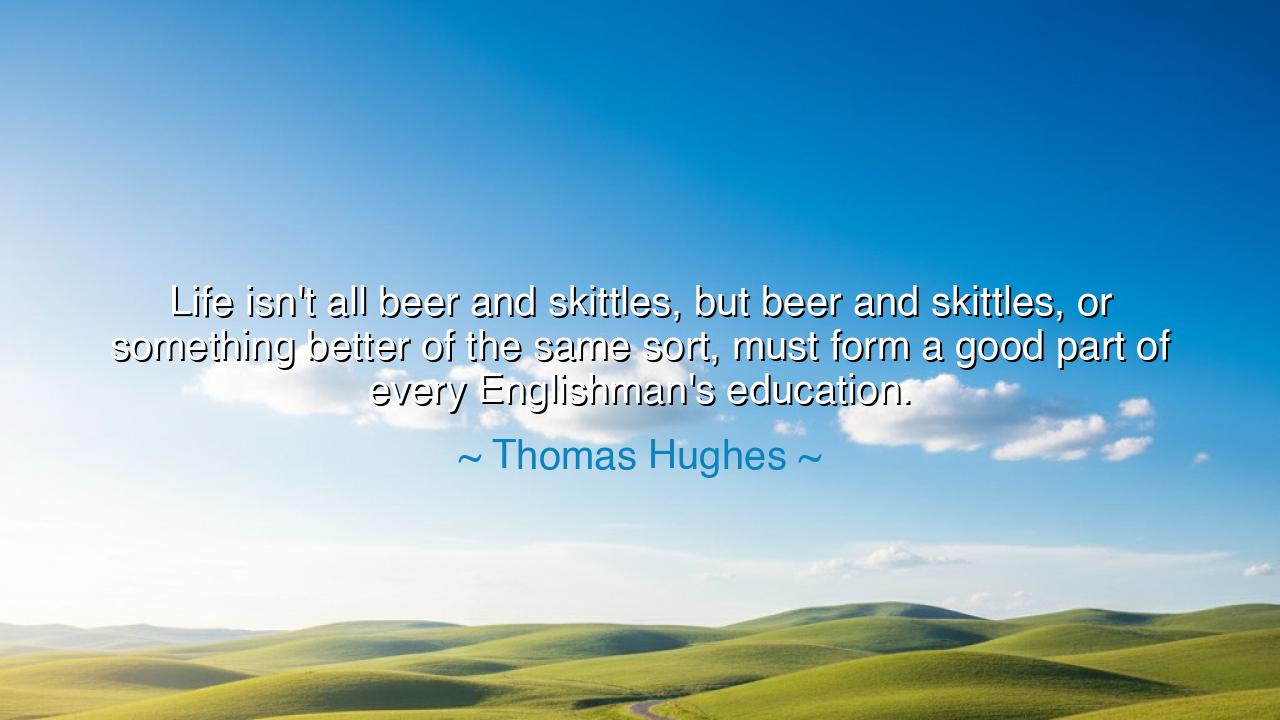
Life isn't all beer and skittles, but beer and skittles, or
Life isn't all beer and skittles, but beer and skittles, or something better of the same sort, must form a good part of every Englishman's education.






Hear the words of Thomas Hughes, the English novelist and reformer, who gave to the world Tom Brown’s School Days and whose pen carved wisdom for both youth and nation: “Life isn’t all beer and skittles, but beer and skittles, or something better of the same sort, must form a good part of every Englishman’s education. At first glance, these words may seem light, a jest about leisure and games. Yet beneath the surface lies a teaching of balance, of joy, and of the harmony that must exist between labor and refreshment if a life is to be lived fully and well.
For life is not all pleasure. To live is to toil, to strive, to endure hardship, and to face the stern duties that each dawn brings. To pretend otherwise is folly. But Hughes reminds us that neither must life be stripped of joy, for joy is the nourishment of the soul. Beer and skittles—symbols of simple fellowship, laughter, and recreation—stand here for the delights that refresh the weary heart. Without them, duty becomes drudgery, and discipline becomes despair. With them, even burdens grow lighter, and toil can be endured with courage.
The wisdom of these words may be traced to the English tradition of sport and camaraderie. Hughes himself, through his tales of schoolboys at Rugby, taught that games were not merely diversions, but essential training for character. Through play, young men learned courage, discipline, fairness, and brotherhood. In this way, beer and skittles are more than indulgence—they are part of education, shaping the whole man, not only in mind but in spirit.
History itself reveals this truth. Consider the Spartan warriors of ancient Greece. Their lives were bound by iron discipline, yet they did not disdain play. Through contests, games, and physical training, they built both strength and unity. What seemed mere recreation was, in truth, the forge of their endurance and courage. Likewise, in Rome, the balance of work and leisure was seen as vital—the philosopher Seneca himself wrote that relaxation is not idleness, but renewal for greater deeds.
Thus, Hughes reminds us that education is incomplete if it teaches only books and burdens, but not joy, friendship, and the art of living well. A man who knows only toil may become hardened and bitter; a man who knows only pleasure becomes weak and careless. But the one who learns to balance both—the sternness of duty with the lightness of play—becomes whole, resilient, and wise.
The meaning is not to exalt beer and skittles alone, but to point to the deeper truth: that recreation, in all its forms, is a vital part of human growth. It need not be ale and games; it may be music, art, sport, fellowship, or laughter shared around a humble table. Whatever form it takes, it is the breathing-space that allows men to endure life’s storms with hearts still strong.
Therefore, O listener, do not despise joy, nor neglect duty. Work hard, but laugh often. Bear your burdens, but also share your cup. Learn as much from the field of play as from the halls of study. For Hughes teaches us that life is not complete without both—the steel of labor and the sweetness of joy.
And so, let your education be full: books for the mind, toil for the body, and beer and skittles, or something better, for the soul. In this balance you will find not only endurance, but delight; not only strength, but wisdom; not only survival, but the art of living richly and well.






AAdministratorAdministrator
Welcome, honored guests. Please leave a comment, we will respond soon